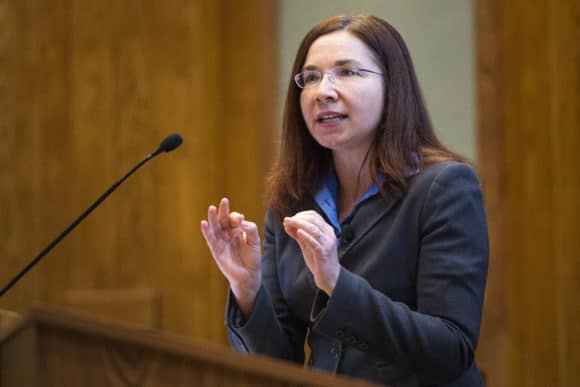Award-winning climate communicator Katharine Hayhoe, an atmospheric scientist, professor of political science at Texas Tech University, and director of the Climate Center, discusses the importance of effective science communication in overcoming barriers to public acceptance of climate change in a recent interview with Rachel Potter, IIASA communications officer.

© Chris.Soldt | Boston College.MTS.Photography
Q: Can you tell us a bit about your specific areas of research as a scientist?
I study what climate change means to people, in the places where we live: how it is affecting our water supply, our health, our air quality, the integrity of our infrastructure, and other human and natural systems. Often when people think about climate change they think about polar bears or people who are living on low-lying islands in the South Pacific. I bring climate change down from the global scale to the local level because when we understand that it is an ‘everything issue’, that’s when we understand that we need to act.
Q: You have been widely recognized as a remarkable communicator. What do you see as key to effective science communication?
I believe effective communication begins with connecting and identifying shared values, and ends with talking about solutions. With climate change, sometimes people are overt in their opposition by outright saying the science isn’t real. More often however, it is passive opposition where people feel the problem is too big and there is nothing they can do to fix it. We need to present people with solutions that are practical and viable – in other words, actions that they can engage in.
Q: Why is science communication important?
Science communication explains how the world works. Today we are conducting an unprecedented experiment with our planet, the only one we have. Understanding this is one of the most important things anyone can do as a human being living on Earth.
Q: Can you briefly outline what you see as trends in public and political opinion with regard to human-induced climate change?
Our world is becoming increasingly polarized and we are dividing into tribes. It is happening with many issues and in many places around the world. When the world is changing so quickly, many of us feel uncomfortable with the rate of change, so we retreat to a more tribalized, divided society where we feel comfortable. But by doing so, we focus on the tiny fraction of what divides us rather than the vast preponderance of what unites us, because it makes us feel more secure to do so.
Climate change is a casualty of this fracturing, tribalism, and polarization that is happening – most notably in the US because there are only two political parties, so the tribalization there is much more obvious. In the US, the best predictor of whether people agree with the facts that: climate is changing, humans are responsible, and the impacts are serious, is not how much they know about science, it’s simply where they fall on the political spectrum. This politicization of science is also happening in the UK, Austria, across Europe, Canada, Australia, and Brazil.

© IIASA Katherine Hayhoe with members of the IIASA Women in Science Club
Q: How can this polarization and the barriers to dealing with climate change be challenged?
Climate change is a human issue – it doesn’t care if we are liberal or conservative, rich or poor, although the poor are being more affected than the rich. It affects all of us and almost everything we care about. For that reason, we must emphasize what unites us rather than what divides us. We need to challenge the idea that the solutions to climate change pose a bigger threat to our wellbeing, our comfort, the quality of our lives, our identity and who we are, than the impacts.
We must expose the myths that underlie inaction around climate change and examine them in an objective way. Will it really ruin our economy to fix climate change? Will it take us back to the Stone Age? If we don’t tackle the myths directly, they will continue to thrive in our sub-conscious. For example, in Canada there is an idea that a carbon tax will destroy the economy. I like to point out that there were four provinces in Canada that had a price on carbon before it became a federal policy, and those four provinces have led the country in terms of economic growth and output.
Q: What part do you see IIASA playing in being able to build bridges between countries across political divides?
IIASA stands in a key position at a pivotal time. It is a truly international organization in terms of its mandate, structure, governance, and the people that work here. Climate change is a global problem and IIASA is a global institution that can offer both big-picture and regionally-specific insights into climate impacts and solutions.
Katharine Hayhoe visited IIASA on 4 October 2019 to give a lecture titled, Barriers to Public Acceptance of Climate Science, Impacts, and Solutions, to IIASA researchers and to meet with the IIASA Women in Science Club. IIASA has a worldwide network of collaborators who contribute to research by collecting, processing, and evaluating local and regional data that are integrated into IIASA models. The institute has 819 research partner institutions in member countries and works with research funders, academic institutions, policymakers, and individual researchers in national member organizations.
Note: This article gives the views of the author, and not the position of the Nexus blog, nor of the International Institute for Applied Systems Analysis

You must be logged in to post a comment.